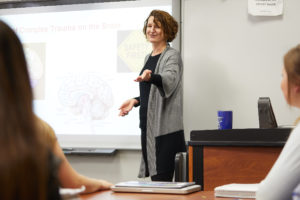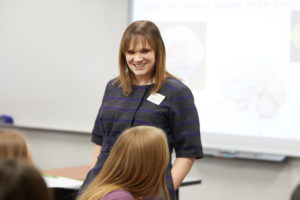Posted 9:34 a.m. Friday, June 29, 2018

UWL faculty members, students help local school with goal to be ‘trauma informed.’
UWL faculty members, students help local school with goal to be ‘trauma informed’
A student arrives at school in soiled clothes with no backpack or clear idea of where he will sleep at night. The student’s parents were recently evicted from their apartment, and he walked to school from a nearby shelter. As the school day goes on, the student is in a hyper-aroused mental state. Seemingly small things such as having an incorrect answer on an assignment or cancelling recess provoke an outburst. Although a hypothetical example, Northside Elementary Principal Laura Huber has seen similar situations at her school. The common theme is this: a student arrives at the school under extreme stress, is unready to learn and has difficulty controlling his or her emotions based on a traumatic event. About three years ago, Northside staff were noticing an increase in children coming to school who are experiencing trauma. Then, in March 2017, Northside’s School Counselor Melani Faye invited UW-La Crosse School Psychology Professor Betty DeBoer and Chileda’s School Counselor Chris Nelson to train staff on trauma informed education, an emerging idea in school psychology programs and educational settings across the country. [caption id="attachment_52433" align="alignright" width="300"] UWL Psychology Professor Betty DeBoer is assessing Northside Elementary School’s strengths and needs to become trauma informed.[/caption]
Adults in a trauma-informed school are trained on how to think about and react when students come to school with potentially traumatizing stress, whether it is caused by unstable home lives, life-changing family events such as caregiver military deployment or significant illness, or attachment-related issues that started at birth.
Instead of focusing on a student’s outward behavior issue, teachers think about how outward behavior may be the result of what’s going on inside the brain such as how neural pathways were formed in early development or how a student’s current psychological state is impacting his or her ability to handle the task at hand. Understanding these inner struggles can be the key to helping these students reconnect and begin making new, healthier neural pathways.
Trauma informed schools also have systems to support teachers so the school can be a safe and respectful environment that promotes healthy relationships, self-management and academic skills. Additionally, teachers have colleagues who they can go to for help.
With funding from several grants, DeBoer was invited back to Northside Elementary this academic year to support it in becoming a trauma informed school. She is assessing the school’s strengths and needs to become trauma informed. She has observed classrooms, interviewed faculty, and conducted surveys of staff, students and parents. A dozen school psychology graduate students and almost another two dozen undergraduate teacher education and psychology students have helped her with the needs assessment thus far.
Over the next year, DeBoer aims to help the school develop policies and procedures, provide staff training and expand supports based on what she has found. The goal is to ensure that students who are experiencing trauma and need support are getting it, cultural issues are considered and the environment is welcoming.
“Often, the secret of being a trauma consultant is recognizing that the staff have many insightful suggestions,” says DeBoer. “It is a matter of finding and organizing them within a trauma informed framework.”
About 15-20 UWL teacher education candidates who are completing field school or student teaching at Northside Elementary and Coulee Montessori (located in the same building) are also learning from DeBoer’s work. Watching her presentations and visiting classes, they are beginning to understand how they might better respond when a student is triggered by an issue like homelessness in their future classrooms, says Alyssa Boardman, assistant professor of Educational Studies.
[caption id="attachment_52432" align="alignleft" width="300"]
UWL Psychology Professor Betty DeBoer is assessing Northside Elementary School’s strengths and needs to become trauma informed.[/caption]
Adults in a trauma-informed school are trained on how to think about and react when students come to school with potentially traumatizing stress, whether it is caused by unstable home lives, life-changing family events such as caregiver military deployment or significant illness, or attachment-related issues that started at birth.
Instead of focusing on a student’s outward behavior issue, teachers think about how outward behavior may be the result of what’s going on inside the brain such as how neural pathways were formed in early development or how a student’s current psychological state is impacting his or her ability to handle the task at hand. Understanding these inner struggles can be the key to helping these students reconnect and begin making new, healthier neural pathways.
Trauma informed schools also have systems to support teachers so the school can be a safe and respectful environment that promotes healthy relationships, self-management and academic skills. Additionally, teachers have colleagues who they can go to for help.
With funding from several grants, DeBoer was invited back to Northside Elementary this academic year to support it in becoming a trauma informed school. She is assessing the school’s strengths and needs to become trauma informed. She has observed classrooms, interviewed faculty, and conducted surveys of staff, students and parents. A dozen school psychology graduate students and almost another two dozen undergraduate teacher education and psychology students have helped her with the needs assessment thus far.
Over the next year, DeBoer aims to help the school develop policies and procedures, provide staff training and expand supports based on what she has found. The goal is to ensure that students who are experiencing trauma and need support are getting it, cultural issues are considered and the environment is welcoming.
“Often, the secret of being a trauma consultant is recognizing that the staff have many insightful suggestions,” says DeBoer. “It is a matter of finding and organizing them within a trauma informed framework.”
About 15-20 UWL teacher education candidates who are completing field school or student teaching at Northside Elementary and Coulee Montessori (located in the same building) are also learning from DeBoer’s work. Watching her presentations and visiting classes, they are beginning to understand how they might better respond when a student is triggered by an issue like homelessness in their future classrooms, says Alyssa Boardman, assistant professor of Educational Studies.
[caption id="attachment_52432" align="alignleft" width="300"] Alyssa Boardman, assistant professor of Educational Studies[/caption]
“They (student teachers) need to be part of this process so they can learn what it means to have a trauma lens,” explains Boardman.
DeBoer stresses being a trauma-informed school is not just about training staff. It’s also about having support for staff by helping them when things are no longer manageable in class, and helping their needier students develop self regulation and competence with supplemental supports, such as small group or individual counseling.
Northside staff have appreciated the practicality of the information DeBoer has shared thus far, says Huber.
“I think staff appreciate being heard,” says Huber. “Their worries about children are validated, and they feel hopeful for the next stage.”
Boardman hopes her teacher education students will bring the ideas with them to their future schools, realizing options they have in situations where traditional classroom management techniques don’t work.
Alyssa Boardman, assistant professor of Educational Studies[/caption]
“They (student teachers) need to be part of this process so they can learn what it means to have a trauma lens,” explains Boardman.
DeBoer stresses being a trauma-informed school is not just about training staff. It’s also about having support for staff by helping them when things are no longer manageable in class, and helping their needier students develop self regulation and competence with supplemental supports, such as small group or individual counseling.
Northside staff have appreciated the practicality of the information DeBoer has shared thus far, says Huber.
“I think staff appreciate being heard,” says Huber. “Their worries about children are validated, and they feel hopeful for the next stage.”
Boardman hopes her teacher education students will bring the ideas with them to their future schools, realizing options they have in situations where traditional classroom management techniques don’t work.
